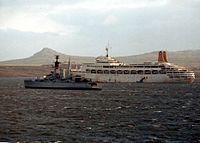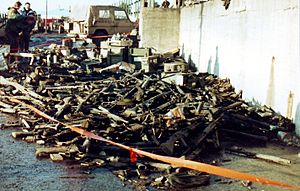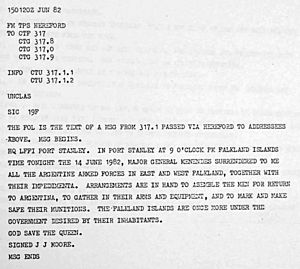Argentine surrender in the Falklands War facts for kids
The final part of the Falklands War was when the Argentine Governor in Port Stanley agreed to give up. This happened after a tough fight.
Contents
The Surrender
At 9 PM on June 14, 1982, General Mario Menéndez, who was in charge of the Argentine forces in Stanley, surrendered to Major General Jeremy Moore. This decision went against the Argentine Army's rules. Their rules said they shouldn't surrender unless more than half their soldiers were hurt and most of their ammunition was gone.
General Menéndez talked with the British to change some parts of the surrender document.
- The words "unconditional surrender" (meaning giving up completely without any conditions) were changed to just "surrender".
- The Argentine units were allowed to keep their flags.
- Their officers would still be in charge of their soldiers.
- The surrender ceremony would be private, not public.
- Argentine officers could keep their sidearms (small guns).
One point was not agreed to: the Argentines wanted to send their 11,313 prisoners of war (POWs) home on their own ships. Instead, 4,167 of them were sent back to Argentina on the large ship Canberra. The Argentine government had wrongly said that this ship was badly damaged during the Battle of San Carlos.
Signing the Surrender Document
Many important people were there when the surrender letter was signed. They included:
- Captain Melbourne Hussey, from the Argentine Navy, who helped translate.
- General de Brigada Mario Menéndez, from the Argentine Army.
- Vicecomodoro Carlos Bloomer-Reeve, from the Argentine Air Force.
- Vicecommodore Eugenio J Miari, from the Argentine Air Force, who was a senior legal advisor.
- Captain Rod Bell, from the Royal Marines, who also helped translate.
- Lieutenant-Colonel Geoff Field, from the Royal Engineers.
- Colonel Brian Pennicott, from the Royal Artillery.
- Major General Jeremy Moore, from the Royal Marines.
- Colonel Mike Rose, from the Special Air Service.
- Colonel Tom Seccombe, from the Royal Marines.
- Staff Sergeant Glenn Harwood, from the Royal Signals.
The surrender letter said:
Headquarters, Land Forces
Falkland Islands
INSTRUMENT OF SURRENDER
I, the undersigned, Commander of all the Argentine land, sea and air forces in the Falkland Islands [Menéndez's signature] surrender to Major General J.J. MOORE CB OBE MC* as representative of Her Britannic Majesty's Government.Under the terms of this surrender all Argentine personnel in the Falkland Islands are to gather at meeting points chosen by General Moore. They will hand over their weapons, ammunition, and all other war equipment as directed by General Moore or other British officers working for him.
After the surrender, all Argentine soldiers will be treated with respect, following the rules of the Geneva Convention of 1949. They will follow any instructions about moving and where they will stay.
This surrender starts at 2359 hours ZULU on 14 June (2059 hours local). It includes all Argentine forces in and around Port Stanley, those on East Falkland, (Menendez's signature) West Falkland, and all other nearby islands.
[Menéndez's signature] Commander Argentine Forces
[Moore's signature] J. J. MOORE Major General
[Pennicott's signature] Witness
2359 hours 14 June 1982
The time of surrender was officially recorded as 23:59 (11:59 PM) on June 14, 1982. This was done so that both Zulu time (a worldwide standard time) and the local time in the Falklands were on the same date. This helped avoid confusion for the Argentine troops.
Captured Argentine Equipment
After the surrender, the British captured a lot of Argentine military equipment. Here are some of the approximate numbers:
- About 100 Mercedes-Benz trucks.
- 20 Unimogs (off-road trucks).
- 50 Mercedes-Benz G-Class 4x4 vehicles.
- 12 Panhard AML 90mm armored vehicles.
- 1 SAM Roland missile launcher.
- 7 SAM Tigercats missile launchers.
- 1 homemade Exocet missile launcher.
- 3 CITER 155mm L33 Guns (large cannons).
- More than 10 Oto Melara 105mm cannons.
- More than 15 Oerlikon twin 35 mm and 15 Rheinmetall twin 20 mm anti-aircraft cannons.
- 20 Hispano Suiza 30 mm single barrel guns.
- 1 AN/TPS-43 3D mobile air search radar.
- 1 AN/TPS-44 mobile air search radar.
- More than 5 Skyguard radar systems (one was damaged).
- 1 Super Fledermaus radar and several RASIT fire control radars.
- Blowpipe shoulder-fired missiles.
- SAM-7 shoulder-fired missiles (bought from Libya in late May).
- 14 working helicopters, including 2 Agusta A109, 2 Bell 212, 8 UH-1H, 1 Chinook, and 1 Puma.
- More than 10 FMA IA 58 Pucará attack planes.
- 1 Aermacchi MB-339 training jet.
- The Argentine Coast Guard patrol boat GC82 Islas Malvinas, which was renamed HMS Tiger Bay by the British.
- More than 11,000 personal weapons.
- Over 4 million 7.62 ammunition rounds.
Some of this equipment was made unusable by Argentine soldiers before they surrendered.
After the war, Argentina formed the Rattenbach commission to look into why they lost. This group suggested serious punishments for some of the officers in charge.
What Happened Next
On June 20, the British took back the South Sandwich Islands. They announced that the fighting was over after removing Argentina's base at Corbeta Uruguay base on Southern Thule. This Argentine base had been there since 1976, but the UK had only protested it through diplomatic talks until 1982.
The war lasted 74 days. During this time, 255 British soldiers, marines, sailors, and airmen died. Also, 649 Argentine soldiers, marines, sailors, and airmen died, along with three civilians from the Falkland Islands.
The British Government decided that all secret information about the war would be made public in the year 2082. However, thanks to the Freedom of Information Act, a lot of this information is now available sooner.
The original surrender document is on display at the Imperial War Museum in London.
Relations between the UK and Argentina were not fully restored until 1989. This happened under an agreement called the umbrella formula. This agreement meant that the disagreement over who owns the Falkland Islands would be put aside for a while.
Since 1984, June 14 has been a public holiday in the Falkland Islands. It is officially called "Liberation Day" because it marks the day the islands were freed.
See Also
 | Lonnie Johnson |
 | Granville Woods |
 | Lewis Howard Latimer |
 | James West |




